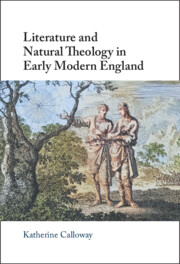Book contents
- Literature and Natural Theology in Early Modern England
- Literature and Natural Theology in Early Modern England
- Copyright page
- Dedication
- Contents
- Figures
- Preface
- Acknowledgments
- Introduction
- Part I Metaphysical Poets
- Chapter 1 A “Metaphorical God” and the Book of Nature
- Chapter 2 “I Summon’d Nature”
- Chapter 3 “Mutters of Assent” or “Lectures for the Eye”
- Part II Imagined Worlds
- Epilogue
- Works Cited
- Index
Chapter 2 - “I Summon’d Nature”
George Herbert and Henry Vaughan on Science and Nature
from Part I - Metaphysical Poets
Published online by Cambridge University Press: 07 October 2023
- Literature and Natural Theology in Early Modern England
- Literature and Natural Theology in Early Modern England
- Copyright page
- Dedication
- Contents
- Figures
- Preface
- Acknowledgments
- Introduction
- Part I Metaphysical Poets
- Chapter 1 A “Metaphorical God” and the Book of Nature
- Chapter 2 “I Summon’d Nature”
- Chapter 3 “Mutters of Assent” or “Lectures for the Eye”
- Part II Imagined Worlds
- Epilogue
- Works Cited
- Index
Summary
This chapter considers Herbert and Vaughan’s foundational views of science and nature, toward exploring their views of natural theology more specifically in Chapter 4. How does each poet conceive of the relationships between God, humans and nature, and does he see human inquiry into nature as leading to theological insight? Both Herbert and Vaughan engage these questions, though they differ starkly on the answers. Vaughan is less dismissive of human science than is Herbert, for instance. And although both poets share a conviction that the natural world is not as it should be, Herbert sees the world as destined for conflagration while Vaughan’s hope—repeated throughout Silex Scintillans—is instead for regeneration.
Keywords
- Type
- Chapter
- Information
- Literature and Natural Theology in Early Modern England , pp. 61 - 83Publisher: Cambridge University PressPrint publication year: 2023

